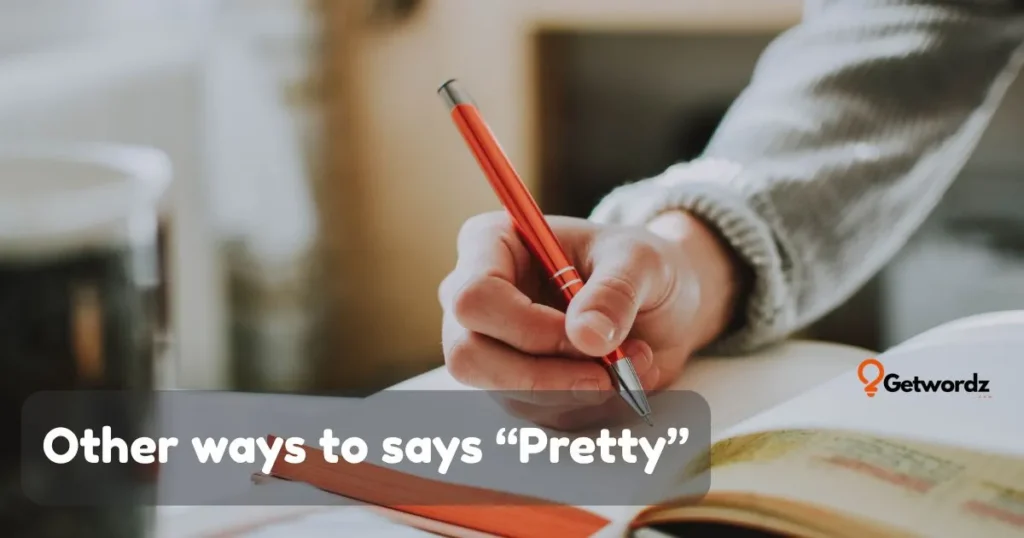Pretty is one of those timeless words we all use to describe something or someone attractive, appealing, or simply pleasant to look at. Whether it’s a pretty smile, a pretty outfit, or a pretty moment, this little word sneaks into countless compliments and captions. But let’s be honest, because it’s used so often, it can sometimes feel overused or generic, especially when you’re trying to express genuine admiration or emotion in a fresh way.
If you’ve ever caught yourself typing “pretty” in every other message, or saying it too often when describing your friends, family, colleagues, or partner, you’re not alone. Many people search for different ways to say “pretty” because they want their words to feel more authentic, creative, and expressive, not repetitive or dull.
That’s where this guide comes in. Here, you’ll find unique expressions, creative alternatives, and better wording for “pretty” that capture the same warmth and charm but in more meaningful, personal, or even funny ways. These phrases will help you sound more thoughtful whether you’re writing a compliment, a message, or a social media caption.
Ready to discover new and beautiful ways to say “pretty”? Let’s dive into the list and refresh your vocabulary with style and sincerity.
1. Gorgeous
Scenario: You might use “gorgeous” when describing a friend’s outfit, a sunset, or even a special occasion photo that truly takes your breath away. It’s perfect for moments when “pretty” doesn’t feel strong enough.
Explanation: “Gorgeous” is a powerful and expressive alternative to “pretty.” It adds more intensity and emotion, often used in both casual compliments and heartfelt praise. This creative alternative sounds natural, confident, and full of admiration.
Examples:
- You look absolutely gorgeous in that dress!
- The view from this hilltop is simply gorgeous.
- That design is so gorgeous it deserves to be framed.
Why It Works: “Gorgeous” captures deeper appreciation than “pretty,” making it more versatile and flattering. It conveys sincerity and admiration while sounding polished and modern.
2. Lovely
Scenario: When complimenting a friend on their personality, outfit, or even their handwriting, “lovely” feels charming and warm. It works well in both text messages and real-life chats.
Explanation: “Lovely” is a gentle and polite synonym for “pretty.” It feels refined and elegant, making it a better wording choice for formal or friendly interactions alike.
Examples:
- You have such a lovely smile.
- That’s a lovely photo of you two.
- What a lovely surprise to see you here!
Why It Works: “Lovely” adds a touch of grace and softness, making your compliments sound thoughtful and genuine. It’s a timeless choice that never feels overused.
3. Beautiful
Scenario: Perfect for expressing deep admiration for someone’s looks, artwork, or even a meaningful experience. It’s an all-purpose term that elevates any compliment.
Explanation: “Beautiful” is a classic and emotional alternative to “pretty.” It expresses a stronger, more heartfelt sentiment and suits both romantic and friendly situations.
Examples:
- You look beautiful tonight.
- That story was so beautiful, it moved me to tears.
- This garden is truly beautiful in spring.
Why It Works: “Beautiful” feels universal and emotionally rich, making it one of the most effective and natural replacements for “pretty.”
4. Stunning
Scenario: When you see someone or something so amazing it stops you mid-sentence, “stunning” says it best. It works for describing people, scenery, or even achievements.
Explanation: “Stunning” is a vivid and energetic synonym for “pretty.” It delivers impact and excitement, often used in social media captions and modern conversations.
Examples:
- You look absolutely stunning in that gown.
- What a stunning landscape!
- Her performance was stunning from start to finish.
Why It Works: “Stunning” makes your compliment sound modern and expressive, perfect for both formal admiration and casual praise.
5. Adorable
Scenario: You’d say “adorable” when talking about a child, pet, or even a cute moment between friends. It adds a warm, affectionate tone.
Explanation: “Adorable” is a sweet and friendly alternative to “pretty.” It emphasizes charm, innocence, and emotional connection, ideal for social media or personal chats.
Examples:
- That puppy is just adorable!
- You two make an adorable couple.
- Your laugh is absolutely adorable.
Why It Works: “Adorable” instantly adds warmth and emotional appeal, helping your compliment sound genuine and heartwarming.
6. Charming
Scenario: You might use “charming” when someone’s personality or mannerisms make them especially likable. It works great for describing both appearance and character.
Explanation: “Charming” is a refined and expressive synonym for “pretty.” It highlights a mix of beauty and charisma, making it a unique expression suitable for compliments that go beyond looks.
Examples:
- He’s such a charming person, it’s hard not to smile around him.
- That little café on the corner is so charming.
- You have a charming sense of style.
Why It Works: “Charming” blends appearance and personality, making it one of the most versatile alternatives to “pretty.” It feels warm, sophisticated, and genuine.
7. Cute
Scenario: When something or someone makes you smile effortlessly, like a pet, outfit, or selfie, “cute” is your go-to word. It fits casual and playful tones perfectly.
Explanation: “Cute” is a fun, youthful alternative to “pretty.” It conveys affection and admiration in a light, easygoing way, making it perfect for friendly or flirty exchanges.
Examples:
- You look so cute in that jacket!
- That’s a cute idea for your birthday post.
- Your handwriting is too cute to be real.
Why It Works: “Cute” adds a playful and approachable tone, making compliments sound sincere and spontaneous rather than formal or rehearsed.
8. Radiant
Scenario: Use “radiant” when someone looks full of life, happiness, or confidence, like after a great day or special event.
Explanation: “Radiant” is a positive and uplifting alternative to “pretty.” It describes beauty that shines from within, connecting physical appeal with joyful energy.
Examples:
- You look radiant today!
- Her smile was radiant throughout the ceremony.
- The bride looked absolutely radiant walking down the aisle.
Why It Works: “Radiant” emphasizes inner glow and positivity, making it one of the most complimentary and empowering ways to replace “pretty.”
9. Elegant
Scenario: When you’re admiring someone’s style, grace, or behavior, “elegant” fits perfectly. It’s ideal for formal settings or sophisticated praise.
Explanation: “Elegant” is a classy and graceful synonym for “pretty.” It reflects refinement, confidence, and poise, making it great for professional or special occasions.
Examples:
- You looked so elegant at dinner last night.
- That’s an elegant way to solve the problem.
- The design of this restaurant is truly elegant.
Why It Works: “Elegant” brings maturity and sophistication to your compliment, making it a more polished and professional version of “pretty.”
10. Attractive
Scenario: When describing someone you find visually appealing or confident, “attractive” is direct but still polite and respectful.
Explanation: “Attractive” is a straightforward, neutral alternative to “pretty.” It works well in formal contexts and avoids sounding overly emotional.
Examples:
- He’s a very attractive person.
- Your profile picture looks quite attractive.
- The layout of this room is so attractive and balanced.
Why It Works: “Attractive” is universal and flexible, making it suitable for both professional and personal compliments without crossing boundaries.
Read more: 30 Other Ways To Say “Sweet Dreams” With Examples!
11. Graceful
Scenario: When someone moves or behaves with natural poise, whether dancing, speaking, or walking, “graceful” captures it beautifully.
Explanation: “Graceful” is a refined, descriptive synonym for “pretty.” It focuses on elegance and flow, adding depth to your compliments.
Examples:
- She’s always so graceful, no matter the situation.
- That was a graceful way to handle the question.
- The dancer’s movements were absolutely graceful.
Why It Works: “Graceful” connects beauty with motion and attitude, giving your compliment a sophisticated and heartfelt tone.
12. Radiant
Scenario: Perfect for when someone’s happiness makes them glow, after a compliment, an achievement, or even a good day.
Explanation: “Radiant” is a bright and positive alternative to “pretty.” It emphasizes energy, joy, and natural beauty that shines through expression.
Examples:
- You look radiant this morning!
- Her radiant confidence lights up the room.
- The sunset looked radiant over the mountains.
Why It Works: “Radiant” celebrates inner happiness and confidence, making it a meaningful and uplifting way to replace “pretty.”
13. Dazzling
Scenario: When someone’s beauty or talent genuinely leaves you speechless, “dazzling” delivers the right amount of sparkle.
Explanation: “Dazzling” is a bold and expressive synonym for “pretty.” It suggests brilliance and magnetism, perfect for show-stopping moments.
Examples:
- You look dazzling in that outfit.
- The fireworks were absolutely dazzling last night.
- Her voice is as dazzling as her smile.
Why It Works: “Dazzling” gives your compliment energy and excitement, helping it stand out as an eye-catching and creative alternative to “pretty.”
14. Delightful
Scenario: When something makes you genuinely happy or brightens your mood, “delightful” adds a joyful twist.
Explanation: “Delightful” is a friendly, uplifting alternative to “pretty.” It blends appreciation with positivity, making it ideal for warm, genuine compliments.
Examples:
- You have such a delightful laugh.
- That’s a delightful photo of your family.
- The entire evening was simply delightful.
Why It Works: “Delightful” feels genuine, polite, and happy, giving your words an optimistic and endearing tone that fits any social setting.
15. Lovely-Looking
Scenario: When you want to sound casual yet classy, especially in text or conversation, “lovely-looking” fits nicely.
Explanation: “Lovely-looking” is a modern variation of “pretty.” It keeps things light but still adds a sense of style and friendliness.
Examples:
- That’s a lovely-looking bouquet!
- You’re such a lovely-looking couple.
- What a lovely-looking setup for the event.
Why It Works: “Lovely-looking” keeps compliments natural and cheerful without sounding repetitive. It’s a fresh way to express admiration in casual talks or captions.
Read more: 30 Other Ways To Say “I Hope” With Examples!
16. Breathtaking
Scenario: When you see something or someone so beautiful that it literally makes you pause, “breathtaking” captures that moment perfectly.
Explanation: “Breathtaking” is a powerful and emotional synonym for “pretty.” It expresses awe and wonder, often used for landscapes, events, or stunning visuals.
Examples:
- The view from that mountain was absolutely breathtaking.
- You look breathtaking in this photo.
- The performance was breathtaking from start to finish.
Why It Works: “Breathtaking” instantly conveys strong admiration and emotional impact, making it one of the most memorable ways to replace “pretty.”
17. Enchanting
Scenario: When something feels magical or irresistibly charming, like a romantic evening, a soft melody, or someone’s eyes, “enchanting” fits beautifully.
Explanation: “Enchanting” is a romantic and poetic alternative to “pretty.” It evokes a sense of mystery, beauty, and allure, perfect for literary or emotional settings.
Examples:
- You have such an enchanting smile.
- The garden looks enchanting under the lights.
- That movie was truly enchanting from start to end.
Why It Works: “Enchanting” adds a dreamy, story-like quality to your words, making your compliment sound unique and emotionally rich.
18. Exquisite
Scenario: When you want to describe someone or something that feels luxurious, refined, or perfectly detailed, “exquisite” does the job.
Explanation: “Exquisite” is a formal and elegant synonym for “pretty.” It conveys high quality, rarity, and perfection, ideal for art, design, or special occasions.
Examples:
- The detailing on that dress is exquisite.
- You have exquisite taste in jewelry.
- The presentation of this dish looks exquisite.
Why It Works: “Exquisite” sounds sophisticated and polished, giving your compliment an elevated and graceful tone.
19. Striking
Scenario: When someone’s appearance or an object instantly catches your eye, “striking” is the perfect way to describe it.
Explanation: “Striking” is a bold and confident alternative to “pretty.” It emphasizes features that stand out, making it a unique and assertive expression.
Examples:
- You have such striking eyes.
- That color combination is striking and fresh.
- The architecture of this building is strikingly modern.
Why It Works: “Striking” adds power and presence to your compliments, showing that the beauty is distinct and unforgettable.
20. Radiant-Looking
Scenario: When someone’s happiness or health makes them glow, “radiant-looking” adds that perfect touch of positivity.
Explanation: “Radiant-looking” is a bright and optimistic synonym for “pretty.” It highlights energy, confidence, and inner beauty, perfect for heartfelt compliments.
Examples:
- You look radiant-looking today, it must be the sunshine.
- Her radiant-looking glow was impossible to miss.
- That photo of you is absolutely radiant-looking.
Why It Works: “Radiant-looking” connects outer beauty with inner positivity, making your words warm, uplifting, and genuine.
Read more: 30 Other Ways To Say “Thank You Very Much” With Examples!
21. Fetching
Scenario: When you want to sound witty or charming, especially in light-hearted conversation, “fetching” makes a stylish choice.
Explanation: “Fetching” is a vintage yet playful synonym for “pretty.” It conveys appeal, attraction, and charm in a slightly old-fashioned but delightful tone.
Examples:
- You look quite fetching in that outfit.
- That hat is rather fetching on you.
- What a fetching smile you have!
Why It Works: “Fetching” adds character and humor to your compliment, making it memorable and refreshingly different.
22. Alluring
Scenario: When describing someone or something that feels captivating and hard to ignore, “alluring” fits perfectly.
Explanation: “Alluring” is a flirty and mysterious alternative to “pretty.” It emphasizes magnetism and charm, often used in romantic or poetic contexts.
Examples:
- You have such an alluring presence.
- That perfume has an alluring scent.
- The ad’s visuals are incredibly alluring.
Why It Works: “Alluring” adds depth and intrigue to your compliment, making it sound intimate and emotionally engaging.
23. Eye-Catching
Scenario: When you want to describe something that immediately grabs attention, like a design, photo, or outfit, “eye-catching” works wonders.
Explanation: “Eye-catching” is a modern, visual synonym for “pretty.” It’s often used in marketing, fashion, or social media for vibrant and striking looks.
Examples:
- That’s such an eye-catching logo design.
- Your dress is really eye-catching, it stands out beautifully.
- The new product packaging looks super eye-catching.
Why It Works: “Eye-catching” feels fresh and modern, helping your compliment sound dynamic and relevant to visual or creative contexts.
24. Delightful-Looking
Scenario: Perfect for describing charming or cheerful visuals, like decor, desserts, or joyful moments.
Explanation: “Delightful-looking” is a lighthearted and positive variation of “pretty.” It emphasizes pleasantness and happiness, perfect for social posts or friendly chats.
Examples:
- That’s a delightful-looking cake!
- You two make such a delightful-looking pair.
- The table setting is simply delightful-looking.
Why It Works: “Delightful-looking” combines visual appeal with emotional warmth, making your compliment feel joyful and inviting.
25. Picture-Perfect
Scenario: When something looks so flawless it could be in a photo shoot, “picture-perfect” is the ideal expression.
Explanation: “Picture-perfect” is a creative alternative to “pretty” that implies flawless appearance and presentation. It’s often used for events, scenery, or photos.
Examples:
- You both look picture-perfect in that wedding shot.
- The sunset tonight was absolutely picture-perfect.
- That’s a picture-perfect birthday setup!
Why It Works: “Picture-perfect” feels modern and expressive, giving your compliment a visual storytelling feel that fits digital communication.
26. Angelic
Scenario: When someone looks peaceful, pure, or full of kindness, “angelic” captures that serene beauty.
Explanation: “Angelic” is a soft and spiritual synonym for “pretty.” It suggests innocence, warmth, and goodness, perfect for sincere, affectionate compliments.
Examples:
- You look angelic when you smile.
- That baby is absolutely angelic.
- Her voice has an angelic sweetness to it.
Why It Works: “Angelic” adds emotion and purity to your compliment, making it sound heartfelt and deeply kind.
27. Captivating
Scenario: When someone’s presence or appearance keeps your attention effortlessly, “captivating” is the perfect word.
Explanation: “Captivating” is a powerful and elegant synonym for “pretty.” It combines beauty, charm, and attention-holding power, ideal for romantic or professional praise.
Examples:
- You have a truly captivating smile.
- The performance was absolutely captivating.
- Her storytelling is captivating from start to end.
Why It Works: “Captivating” feels sincere, intelligent, and emotionally deep, helping your compliment carry lasting impact.
28. Dreamy
Scenario: When describing something soft, romantic, or pleasantly unreal, like a pastel sky or someone’s eyes, “dreamy” fits naturally.
Explanation: “Dreamy” is a romantic and expressive synonym for “pretty.” It carries a soft, whimsical tone, perfect for compliments in creative or emotional contexts.
Examples:
- You have such dreamy eyes.
- The atmosphere tonight feels dreamy.
- That beach photo looks absolutely dreamy.
Why It Works: “Dreamy” adds emotion and imagination, turning a simple compliment into something sweet and poetic.
29. Glowing
Scenario: When someone looks happy, healthy, or confident, “glowing” is the best way to describe their aura.
Explanation: “Glowing” is a natural and positive alternative to “pretty.” It represents inner joy, confidence, and health, commonly used in both personal and professional compliments.
Examples:
- You’re glowing today, what’s your secret?
- Her glowing skin looks amazing in this light.
- The couple looked so glowing with happiness.
Why It Works: “Glowing” expresses energy and vitality, making it an authentic, uplifting, and relatable compliment.
30. Polished
Scenario: When someone’s style or presentation feels refined and well put together, “polished” makes a great impression.
Explanation: “Polished” is a smart and confident synonym for “pretty.” It’s ideal for describing people who are neat, stylish, and professional.
Examples:
- You look so polished for your interview!
- Her presentation style is always polished and elegant.
- That’s a polished look for the occasion.
Why It Works: “Polished” emphasizes effort, confidence, and class, making it a respectful and modern alternative to “pretty.”
✅ Pros and cons of Using the Keyword “Pretty”
pros
- Highly Searchable: “Pretty” is a popular and frequently searched term, making it great for SEO visibility and audience reach.
- Emotionally Positive: It naturally evokes pleasant emotions and warmth, helping content feel friendly and relatable.
- Versatile Usage: Can describe people, places, moments, or objects — making it flexible for many content types.
- Conversational Appeal: The word feels natural in daily speech, captions, and messages, enhancing readability and tone.
- Engagement-Boosting: Because it’s short and catchy, it tends to perform well in titles, headlines, and social posts.
⚠️ Cons
- Overused and Generic: “Pretty” is so common that it can make your writing sound repetitive or unoriginal.
- Lacks Depth: It doesn’t always convey strong or specific emotions, reducing impact in meaningful contexts.
- Weak SEO Competition: Its popularity makes ranking for it harder without strong optimization or long-tail variations.
- Cultural Variability: The meaning of “pretty” can vary by audience or tone, sometimes creating confusion.
- Limited Professional Use: It may sound too casual or informal in business, academic, or formal writing.
Closing words
Pretty may be a simple word, but this post showed how exploring its creative alternatives can make your compliments and descriptions sound more vivid and genuine. By using different ways to say “pretty,” you can express admiration with more emotion, elegance, or fun, without falling into repetitive phrasing.
You can use these unique expressions when texting friends, writing social media captions, or even crafting thoughtful notes to colleagues and loved ones. Each phrase adds a fresh wording that reflects your personal tone and creativity.
Try one of these creative alternatives in your next message and notice how naturally it connects with people. Choosing more expressive language helps your compliments feel authentic and memorable. So, the next time you want to describe something or someone pretty, do it with heart and originality.




